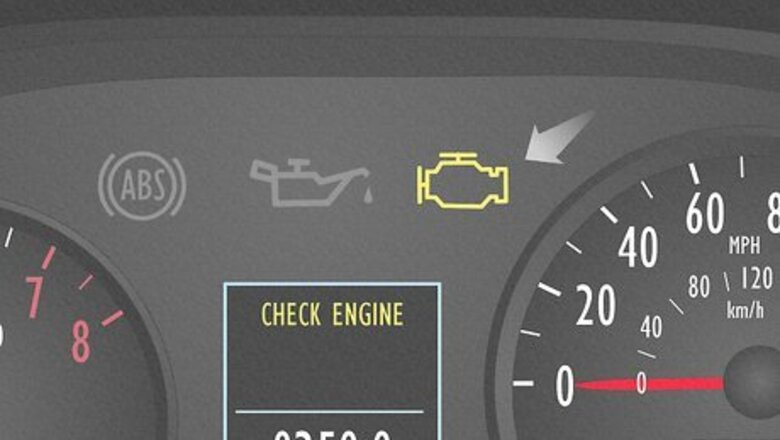
views
Check Engine
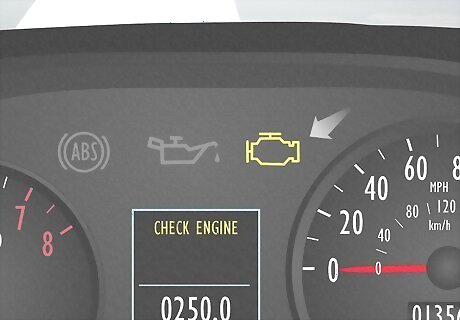
What it looks like: An outline of a car engine, usually with the word CHECK underneath it or on top of it.

What it means: If it’s solid, your engine’s computer has detected a misfire or malfunction in the engine. The cause here could range from something minor, like a loose gas cap that’s letting air into the cylinders and throwing off the air-fuel ratio, or something serious, like a bad catalytic converter or a dying oxygen sensor. If the check engine light is flashing, it’s a sign there’s a potentially catastrophic problem, so pull over and turn the vehicle off.
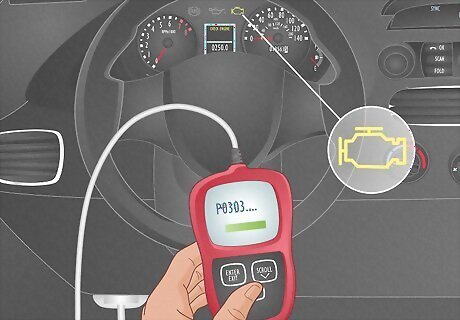
How to fix the issue: Get your check engine light diagnosed and repaired by a mechanic. If you have an OBD-II scanner, plug it into the port under your steering wheel and run a scan to get a diagnostic code.
Battery

What it looks like: A rectangle with a + and – sign on it. You’ll likely see two smaller rectangles on top of the shape to represent the battery terminals.
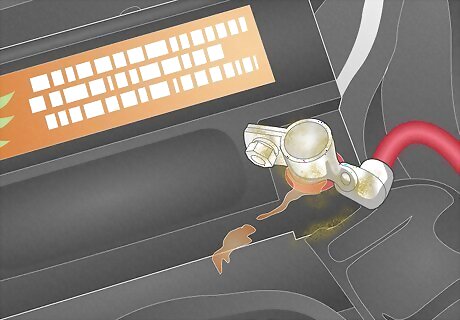
What it means: Something is wrong with your charging or electrical systems. It could be a loose battery cable, a bad alternator, or a dying battery. You’ll likely notice your vehicle has trouble staying on, maintaining dash lights, or accelerating if you have problems with the alternator or battery.
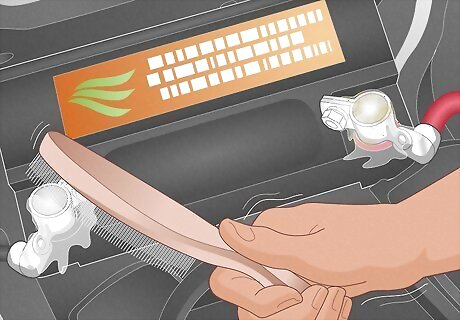
How to fix the issue: Pop the hood and inspect the battery. If you see a chalky substance around the terminals, that’s corrosion. Try cleaning your battery with baking soda, water, and a wire brush to see if that resolves the problem. If it doesn’t, test the battery with a voltmeter by holding the probes against the terminals. If it reads a stable number (usually 12-12.7 volts or so), the battery is fine. If the number fluctuates or it gives no reading, the battery is dying and you need to replace it. If none of this resolves the issue, the issue is probably your alternator, and you need a mechanic to help you out.
Coolant Temperature
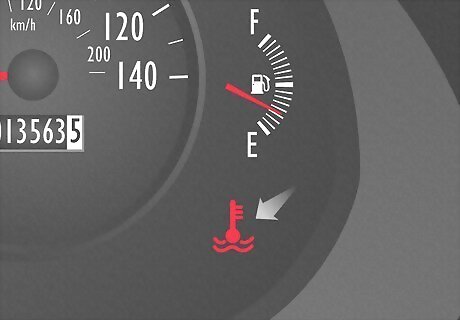
What it looks like: A little thermostat logo with 3 lines sticking out the side of the thermostat’s vertical stick. There will be wavy lines at the bottom of the thermostat bulb. It may be red or blue.

What it means: If it’s blue, this indicator means your coolant or antifreeze is too cold and the engine needs to warm up. If it’s red, your coolant or antifreeze is too hot and you’re going to see a TEMP or ENGINE OVERHEATING indicator if you keep driving. This happens if your coolant levels are too low or there’s a leak in the coolant system.
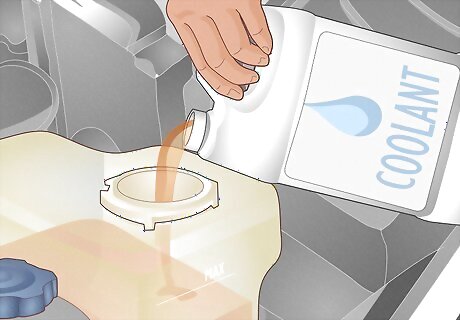
How to fix the issue: If the coolant temperature indicator is blue, just wait until it turns off. It shouldn’t be more than 1-2 minutes, depending on the temperature. If the indicator is red, check your coolant levels. Pop the hood and look to see if the coolant reaches the hash mark on the reservoir. If it does, it may simply be time for a coolant flush or a top off. If it doesn’t, it’s likely damage to your coolant system causing a leak. In any case, see a mechanic to get the system flushed or examined.
Transmission Temperature

What it looks like: A thermostat with 3 horizontal lines sticking out of it surrounded by a gear.
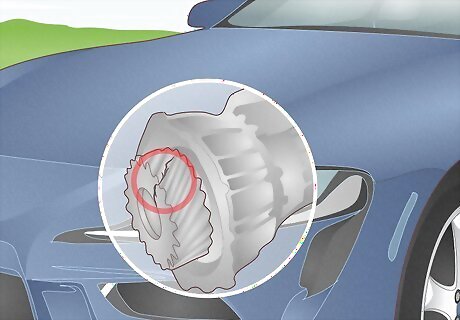
What it means: Your transmission is running hot. If you continue driving, your transmission could reach a critical temperature where it fails. The underlying issue could be something as minor as low transmission fluid levels, or something more complex, such as wear and tear on the internal gears inside of the transmission.
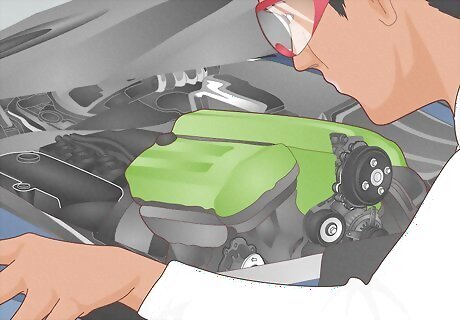
How to fix the issue: The transmission temperature light is no joke, so do not ignore it. Pull over, turn the vehicle off, and get the car towed. See your mechanic to get the transmission looked at. The transmission is likely the most complicated system in your vehicle, and it requires a professional.
Oil Pressure Warning
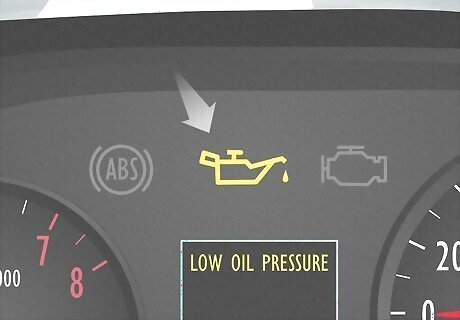
What it looks like: An old school canister with a drop of oil coming out the spout. Some vehicles will include LOW OIL PRESSURE underneath the canister logo.
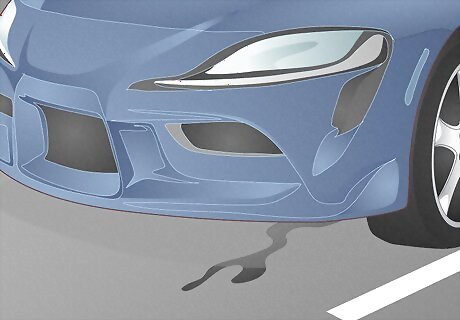
What it means: Your oil pressure is too low. It could be that you’ve got a leak somewhere and the oil has been slowly draining out of your vehicle, or perhaps it’s simply time for an oil change. It could also be that your oil pump or pressure sensor is bad and needs to be replaced.
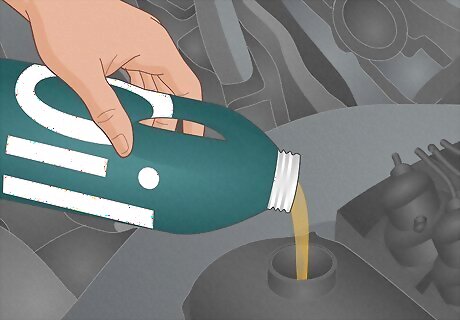
How to fix the issue: An engine without oil is a fire risk, so pull over if you’re driving and get the car towed. If you have an indicator letting you know you need an oil change, you can change the oil yourself if you know how. For all other issues, take the vehicle to a mechanic. They’ll diagnose and fix the issue.
Brake System
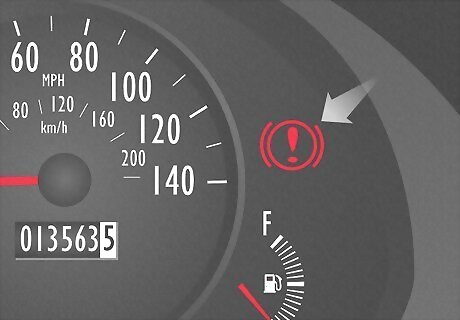
What it looks like: A “!” surrounded by a circle with two symmetrical parentheses on either side. The word BRAKE may come on underneath. In some vehicles, there won’t be a “!” at all and you’ll just see BRAKE.
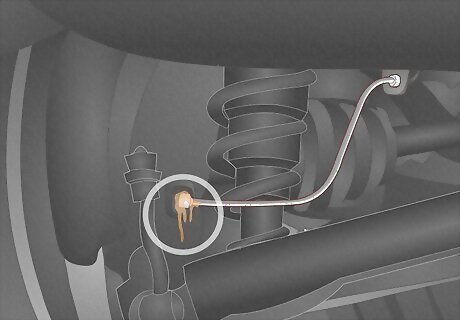
What it means: The hydraulic pressure in your brake system is low. This is a huge problem because it means your brakes are less efficient than they should be, and if there’s a leak, you could lose braking power at any moment.
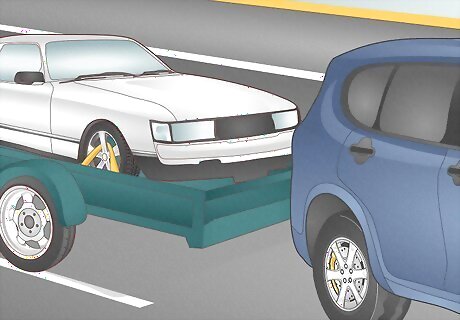
How to fix the issue: If you’re driving, pull over immediately and get your vehicle towed. Brake systems are never a DIY job since they’re essential to the vehicle’s operation, so see a professional mechanic to get your brakes inspected.
Anti-lock Braking System (ABS)

What it looks like: A circle with the letters ABS in the middle and symmetrical parentheses on each side. In some vehicles, you’ll only see the letters ABS.

What it means: It means your vehicle’s anti-lock braking system (ABS) is actively engaged. This is a good thing! It means your vehicle is working as intended. The anti-lock braking system is designed to stutter the brake engagement and prevent slipping when you brake hard.
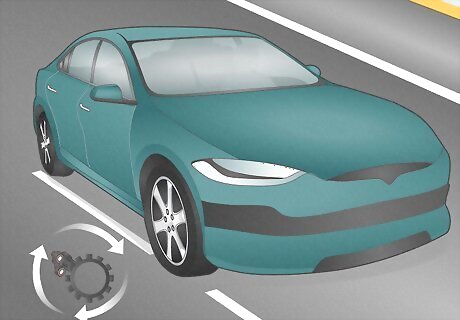
How to fix the issue: There’s nothing to fix. Your car is working the way it should. If the light won’t go away when your car is stationary, see a mechanic.
Traction/Stability Control (TCS)
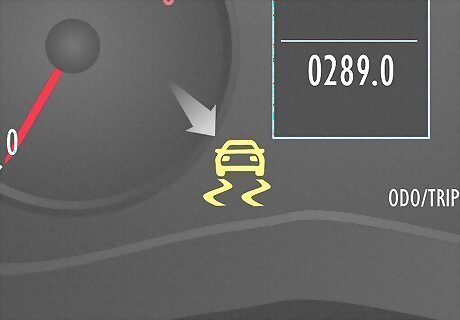
What it looks like: The back of a car swerving away with some little stylistic flourishes coming out of the back tires. There may be the word OFF underneath the logo if the system is off. In some vehicles, it’ll just display TCS.
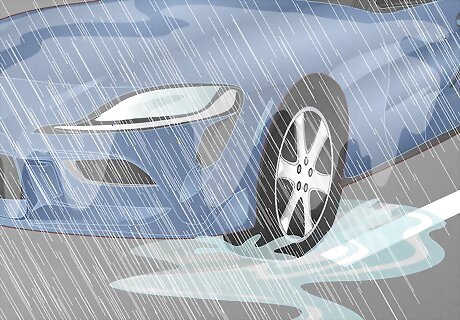
What it means: If the word OFF isn’t present and it’s raining outside or the roads are icy, the indicator means that the traction system is actively engaged and working correctly to keep your vehicle from hydroplaning. If the word OFF is present, it’s a sign that your TCS system is disengaged. If there’s any inclement weather, this is dangerous.
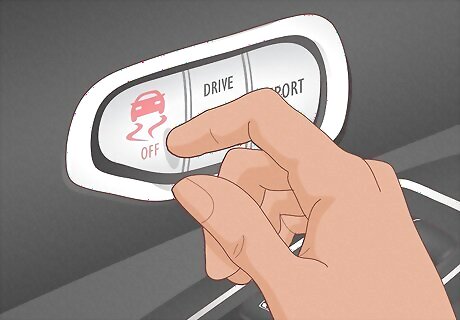
How to fix the issue: If the TCS system is off when it should be on, pull over and refer to your manual to find the button—you probably turned the system off by accident. If the light is on and the roads aren’t dry, everything is working as intended. Slow down a little to avoid losing control, but otherwise, you’re fine.
Tire Pressure Monitoring System (TPMS)

What it looks like: An “!” in the middle of a circular shape with a flat line at the bottom (it’s supposed to look like a flat tire).
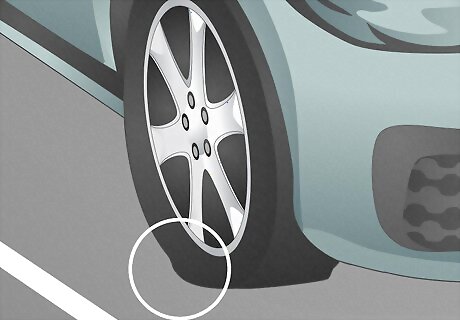
What it means: One or more of your tires is low on air. It could be that a change in air temperature has caused your tires to become slightly less inflated than they should be, or perhaps you’ve run over a nail or rock and punctured a tire. Losing an air valve can also cause air to bleed out slowly over time.
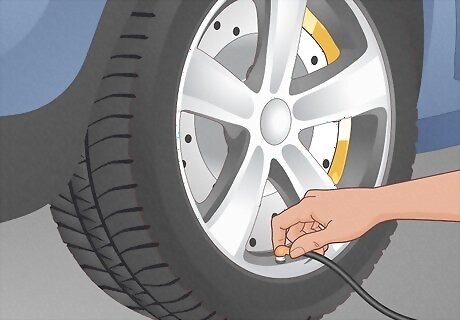
How to fix the issue: Pull into a gas station. Inspect your tires visually. If one of them is obviously low, fill it up. Otherwise, use the pressure gauge to determine how inflated each of your tires is (the psi requirements are printed on the tires and on a sticker on the inside of your door panel). If one of the tires deflates again, you’ve got a leak. Throw the spare on and see a mechanic to get the tire patched.
Airbag Warning

What it looks like: The airbag warning light looks like a little stick figure with an airbag in front of them. In some vehicles, the words AIRBAG or AIRBABG OFF will also appear.
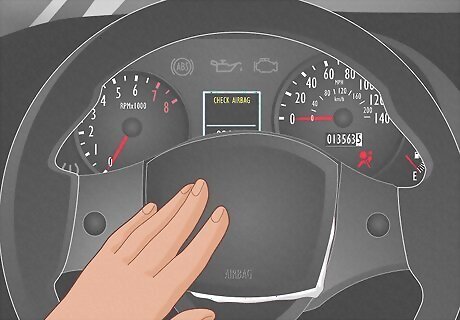
What it means: Your airbag isn’t configured properly. It may still go off in a crash, but something is wrong with the way it’s connected or set up. It could be that some component in the airbag system has gone bad, or perhaps the module controlling the airbag is just wet and needs to dry out. A dead battery or loose connection can also cause the light to come on. The airbag light will also come on if someone isn’t wearing their seatbelt.
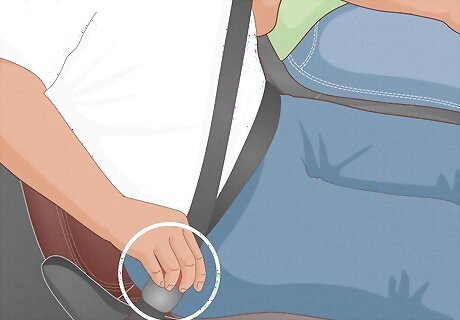
How to fix the issue: If you’ve got passengers, ask everyone to buckle up since the airbag light will come on if it senses passengers who aren’t wearing seatbelts (airbags can be lethal if you aren’t restrained, and thus won’t go off). If that isn’t the issue, try turning your car on and off—the battery may just need to cycle. If that doesn’t do the trick, see a mechanic to get the airbag inspected and repaired.
Fog Lamp
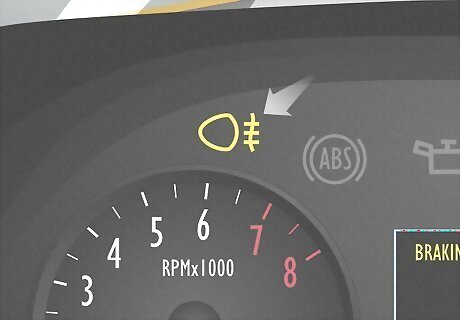
What it looks like: An asymmetrical round shape (it’s supposed to be a bulb) with three horizontal lines and a wavy line on the side. Not every vehicle has fog lights, so you may never see this indicator.
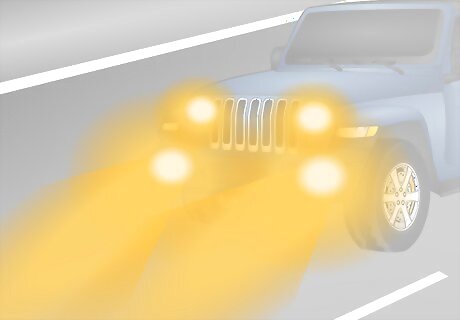
What it means: This isn’t actually a warning light—it’s just letting you know your fog lights are on.
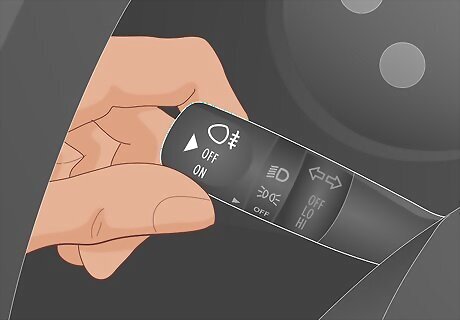
How to fix the issue: You don’t have any problems, but your fog lights are on. If you don’t want them to be on, look on the turn signal stick for a small button labeled FOG (or with the fog light symbol on) and press it.
Lamp Out

What it looks like: A lightbulb with an “!” in the middle of it. There are usually little rays shooting off of the bulb as well.

What it means: This is the lamp or light out indicator. It means that one of the bulbs in your vehicle is out.
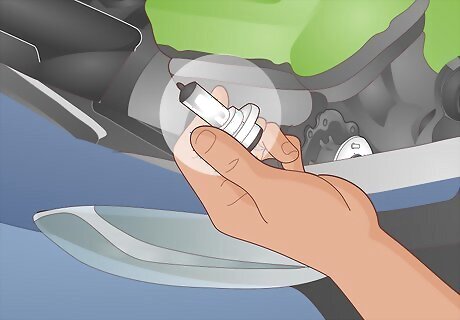
How to fix the issue: Usually, the lamp out indicator only comes on for exterior lights. Turn your vehicle on, take a walk around the exterior, and find the dead bulb. Then, replace it. If you don’t want to do the work yourself, a mechanic should be able to replace the bulb.
Automatic Shift Lock

What it looks like: A shoe inside of a circle with two symmetrical parentheses on either side.
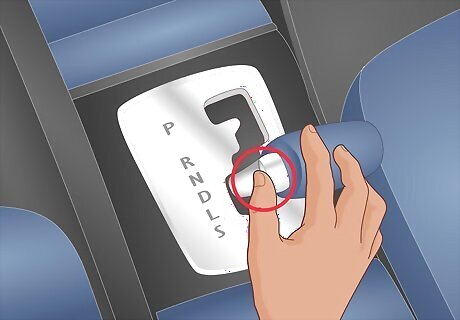
What it means: Your shifter is locked and you can’t change gears. There is a button in most vehicles that will lock the shifter, so you may have accidentally hit that. Alternatively, it could be that your shifter mechanism is broken, the transmission has failed, there’s a dead solenoid, or you’re so low on transmission fluid that your hydraulics are gone.
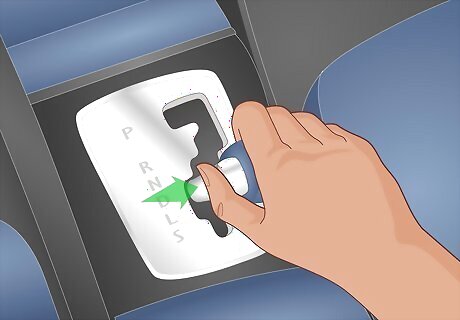
How to fix the issue: If you hit the shifter lock button, pressing it again will fix things. In most vehicles, the shifter lock button is located just above the shifter in the central console. If the button doesn’t do anything, you’ve got an underlying issue. Have your vehicle towed to a mechanic to have them diagnose and fix the problem.
Washer Fluid
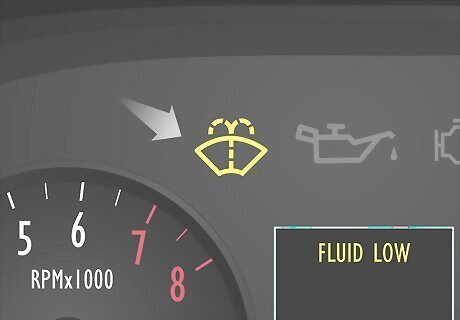
What it looks like: A semi-circle shape filled halfway with liquid. There is a small geyser stream shooting up from the liquid in a symmetrical shape.
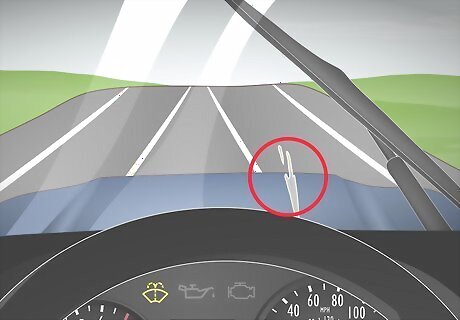
What it means: This is your windshield washer fluid light, and it indicates that your windshield wiper fluid is low (or out entirely).
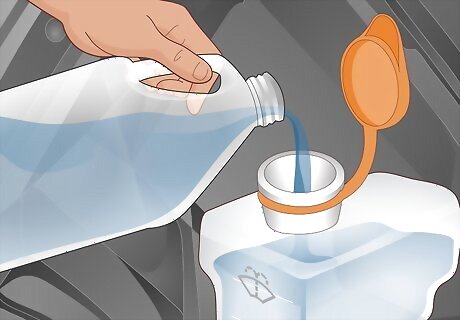
How to fix the issue: Purchase some windshield wiper fluid and refill the reservoir in your engine bay (it’ll have the same logo on the cap as the washer fluid light). If the light still won’t go off, which is rare, it means you may have debris inside the reservoir. Wash it out with distilled water and refill it again with wiper fluid.
Door Open
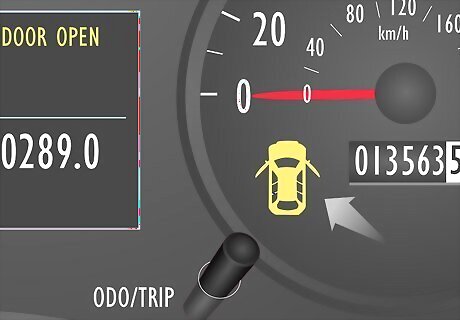
What it looks like: An aerial view of a car with two doors open. In some vehicles, it’ll just say DOOR OPEN or DOOR AJAR.

What it means: One of the doors to the vehicle isn’t closed and the vehicle is running. If all of your doors are fully closed, it means one of the door sensors is dead.
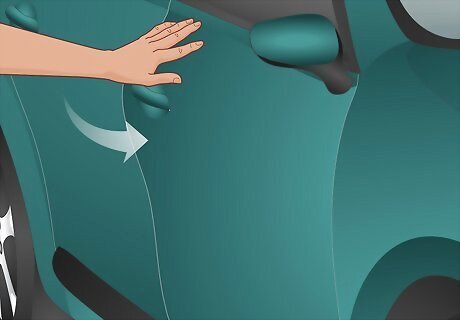
How to fix the issue: Open and close all of the doors to ensure that they’re shut all the way. If the light is still on, the sensors need to be replaced. See a mechanic to get your sensors inspected and replaced.
Low Fuel

What it looks like: An old school filler station with a nozzle and hose. Depending on the vehicle, you may get a LOW FUEL or FUEL LOW indicator as well. Most vehicles also have a little orange or red light that pops on next to the gas gauge when you’re low on fuel.

What it means: Your vehicle is low on fuel. You likely have less than 10% of your tank remaining. If the light is flashing, it means you’re about to run out of gas in the next few moments.
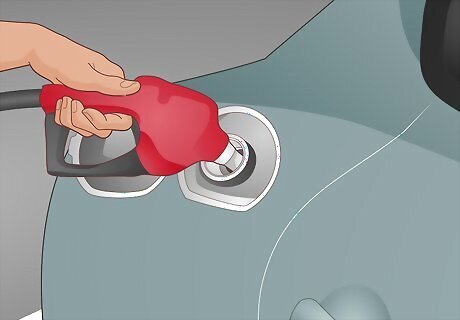
How to fix the issue: Fill your tank up ASAP. In the future, refill your vehicle’s gas tank whenever you reach the ¼ tank level. Driving with less than ¼ tank of gas can cause your fuel pump to work harder and fail sooner.
Security Indicator
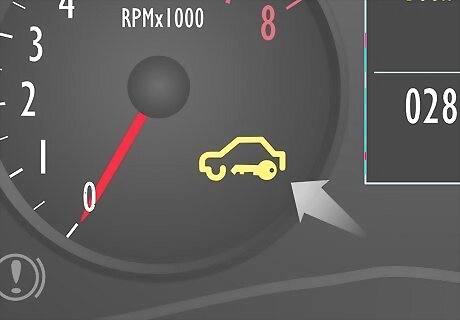
What it looks like: There are 3 popular variations of this one. One looks like a key inside the outline of a car from the side. The other is a lock indicator overlapping with the front of a car. Finally, some vehicles will just display a key.
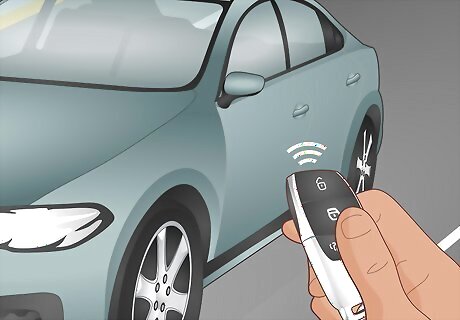
What it means: Usually, this light will pop on as a reminder to lock your car. It will pop on when you turn the accessory power on, then go off once you start the car. If it stays on, the anti-theft system of your vehicle isn’t working correctly.
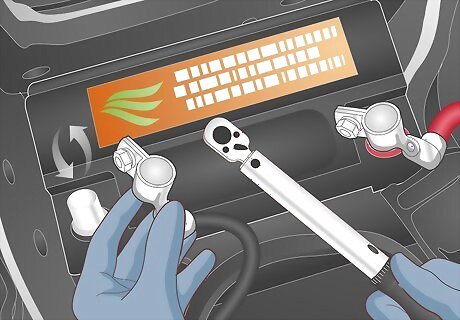
How to fix the issue: If the light goes on and then turns off, it’s working as intended and you don’t have to do anything. If it doesn’t go away, try resetting your battery by removing the negative terminal and putting it back in place. If the light is still on, take your vehicle to the mechanic to get inspected and repaired.
Seat Belt Reminder
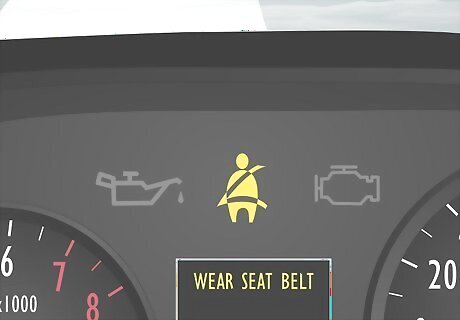
What it looks like: A little person sitting in a chair with a seatbelt on. You’ll also hear a little chime if you ignore the light.

What it means: Someone isn’t wearing their seatbelt!

How to fix the issue: Plug your seatbelt in or tell your passengers to plug their seatbelts in. If the indicator doesn’t go off, the supplemental restraint system (SRS) that monitors your seatbelts needs to be replaced, so see a mechanic.











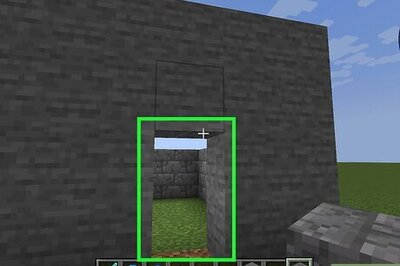


Comments
0 comment